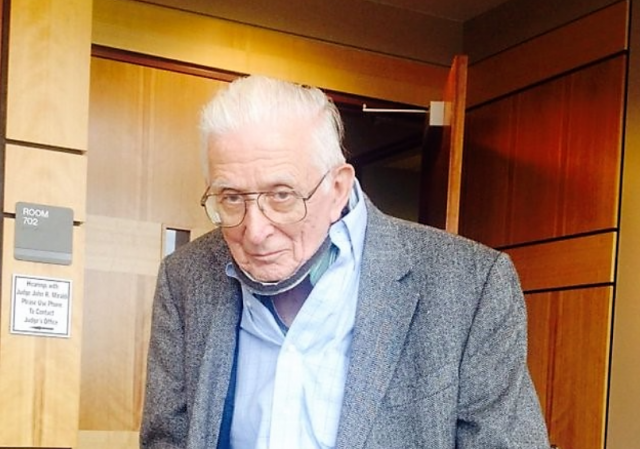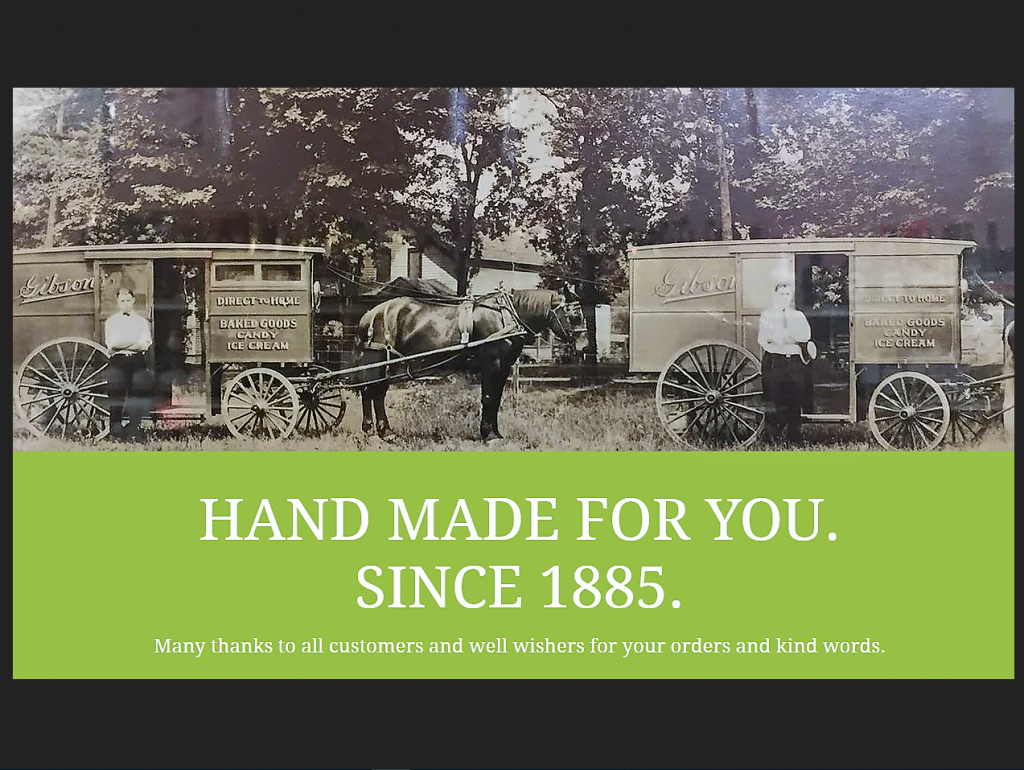Gibson’s Bakery v. Oberlin College – Trial Day 5 – 90-year-old Allyn W. Gibson testifies “some threats made to us”

Today was Day 5 of witness testimony in Gibson Bros. v. Oberlin College. The events giving rise to the lawsuit have been said to represent “the worst of identity politics.” You can read about some of the background on this case here.
Allyn W. Gibson
The 90-year-old Allyn W. Gibson has been described as the “energizer bunny” by those who know him in the Ohio courtroom, because he never seem to let up. The small wiry post-octogenarian, was known few years ago to be hefting 50 pound bags of flour, and getting the chocolate just right for the candy molds at the bakery he owns in Oberlin with his family.

[Gibson’s Bakery Website]
“Grandpa Gibson” would get to work at about 5 a.m. on most days, because he would deliver the pizza dough, bales, donuts and pastries every day at 6:30 am so the Oberlin College students could have freshly made food for breakfast. He got to know the some of the students at the college well, he says, because “I love kids that age, and they are in good moods when they were in our store … a great variety of people I got to know thorough all these years.”
He testified in court today in an ironic twist; he as speaking to a jury because, in part, some of those students he expressed such “love” for marched outside his store in November of 2016 as a protest, and branded him and his family and their business as racist.
“[We’ve had] some threats made to us,” he told the jury. “Some of the students seem afraid to come in the store after the protests, and even now. They have even asked us if they can go out through the back door so their friends don’t see that they shopped with us.”
What is so odd about this branding of the Gibsons’ as racists in the 21th century is the history the family has with the school. Their business was started by settlers in covered wagons from the east in the late 1800s, and has been doing business with the college since the 1910s. In fact, Allyn W. Gibson’s parents were married by Presbyterian minister Charles Finney, who was one of the founders of Oberlin College, it’s second president. Finney was one of the early national advocates for the abolition of slavery, a proponent and supporter of the underground railroad outpost in Oberlin, and helped make Oberlin College the first university in the U.S. to have a universal education acceptance policy, meaning it was the first to accept African-Americans and women.
Gibson did not testify about the protests themselves so much. Part of the reason for that is that the students themselves and their protests chants and signs on those days outside the Gibson store are not technically what is on trial here, and the judge has limited how much of the protest information itself is admissible.
The civil suit is about how Oberlin College may have fanned the racial accusation flames during and after the protests to drive Gibson’s Bakery almost out of business. The jury first has to decide if Oberlin College took part in libeling and defaming the Gibson family and their business supporting students with their racist accusatory message, and if they do find that the college defamed Gibson’s, then how much money that is worth.
This civil lawsuit being heard in Lorain County (OH) Common Pleas Court. The elderly owner of the bakery has been in court from its start a few weeks ago, sitting at the plaintiffs’ table right next to the jury, but his neck is in a brace and he uses a walker to get around. He has had to be helped by his family and attorneys in and out of the courtroom, and today, up to and back from the witness stand.
He told the jury how his physical problems happened that have pushed him out of working at the bakery.About 6 months after the protest, Allyn W. Gibson heard a banging on his first-floor apartment window at about midnight. He woke up, and then went out into the parking lot and saw a car with two people inside and its headlights on. Mr. Gibson said it was unusual for a car to be parked there at that time of night with the car running and the lights on. He testified that he didn’t recognize the people in the car or the car itself.
He decided to go inside and call the police, but fell in his doorway as he tried to do so and broke three vertebrae in his neck. He said people in the car didn’t get out to help him, and the car left as he lay on the concrete, with limited movement: “The pain was so much I couldn’t reach the cell phone for about 20 minutes.”
The reasons this testimony is being permitted is that several witnesses – those who worked at Gibson’s around the time of the protest and in the months directly afterwards – have testified they had had their tires slashed while they worked after the protest, people making nasty comments to them after they left work, and a general feeling of unease that some students seemed to feel toward them and the bakery.
But there was no evidence that anyone associated with the protest or people that supported the protesters was in any way responsible for Mr. Gibson’s accident. Nothing was stolen from his apartment, and the police have never identified who was in the car parked outside his apartment that night.
Two other witnesses provided some insight into the damages that the jury might have to consider should they find Oberlin College guilty of defaming Gibson’s family and their business.
Steve Gibson
Steve Gibson, son and grandson of the two plaintiffs (David Gibson and Allyn W. Gibson), testified about the pain and suffering and change in optimism he had seen in his father and grandfather after the protests. Gibson is a wildlife specialist at the Cleveland Museum of Natural History and helps coordinate the medical care and return to the natural habitat for injured animals. He volunteers as the bakery about 10 hours each month with no pay, as they claim they have had a big sales decline since the protests two-and-a-half years ago.
“My Dad was shocked and confused when all [these racial accusations] happened,” Steve Gibson said. “He as very worried about his family and friends. Nervous. Stressed out.”
“It’s his life, and it’s our home, and he cares so greatly about his friends and family. He puts everyone before himself.”
As for his grandfather, Steve Gibson says he is still hopeful that he can overcome what he has been dealt both physically and emotionally. He remembers how he and his cousins worked every year with their grandfather to make candy canes for the store during the holiday season.
“He is the best person I’ve met in my life who radiates positivity each and every day more than anyone else,” he told the jury. “When we asked him as kids how thing we’re going, he’s always smile and laugh and say ‘Getting better every day.’ He was an unstoppable force that way. Everyone would feed off him.”
“He doesn’t have some of that now, both because of the injury and the protests, but we’re hoping he gets it back.”
Expert Deborah Owens
The other interesting witness was Deborah Owens, professor of marketing at the University of Akron business school. She specializes in consumer buying trends, specifically how social trends and “trying to fit in socially” can have huge effect on consumers in the internet age.
She wasn’t asked about Gibson’s specifically (again, the judge has limited “speculative” testimony), but did expound about how the online news and information world trends now has huge importance on how a business or product is perceived.
Owens and other researchers contend that “word-of-mouth” consumer buying influence has now extended beyond private conversations between two people, and now to include every online message imaginable. And that negative comments have much more impact than positive ones. “Think of it this way,” Owens said. “A one-star rating of a hotel on “Yelp” will have much more influence than nine or ten five-stars.”
A public relations executive had told the court earlier in the proceedings that when you look up “Gibson’s Bakery” on Google, 27 out of the 30 sites listed have the subject of “racism” as a topic included on the site.
Owens testified that negative information on a business affects buyers much more than positive info does, and that in a small market dominated by college-age consumers – as Oberlin is – that multiplies that even further. She said college students are driven in their buying decisions by “negative views and word-of-mouth and their need to be socially desirable.”
“At that age, people are not driven by rational behavior, but by how to fit in socially,” Owens said. “It’s not that they like to be liked so much, but they want to be perceived as fitting in.”
What the Gibson attorneys were implying with Owens’ testimony was that a small business in a small community – with young college students and faculty making up about half the population – the damage caused by word-of-mouth and cultural trends are far harder to reveres than similar problems in larger markets. “People tell more of their friends about negative perceptions than they do positive ones,” she said.
The jury seemed to be paying more attention to Deborah Owens marketing expertise than most of the other witnesses put forth so far.
The civil trial resumes tomorrow and David Gibson, the primary owner of the store, is expected to testify. Oberlin College is expected to begin their defense witness testimony sometime next week
Daniel McGraw is a freelance writer and author in Lakewood, Ohio. Follow him on Twitter @danmcgraw1
————
WAJ NOTE: Our trial coverage is a project of the Legal Insurrection Foundation. Your support helps make this type of coverage possible.
CLICK HERE FOR FULL VERSION OF THIS STORY